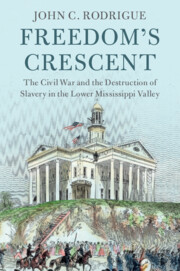
- Publisher:
- Cambridge University Press
- Online publication date:
- January 2023
- Print publication year:
- 2023
- Online ISBN:
- 9781108539715

The Lower Mississippi Valley is more than just a distinct geographical region of the United States; it was central to the outcome of the Civil War and the destruction of slavery in the American South. Beginning with Lincoln's 1860 presidential election and concluding with the final ratification of the Thirteenth Amendment in 1865, Freedom's Crescent explores the four states of this region that seceded and joined the Confederacy: Tennessee, Mississippi, Arkansas, and Louisiana. By weaving into a coherent narrative the major military campaigns that enveloped the region, the daily disintegration of slavery in the countryside, and political developments across the four states and in Washington DC, John C. Rodrigue identifies the Lower Mississippi Valley as the epicenter of emancipation in the South. A sweeping examination of one of the war's most important theaters, this book highlights the integral role this region played in transforming United States history.
Finalist, 2024 Gilder Lehrman Lincoln, The Gilder Lehrman Institute of American History
Winner, 2024 John L. Nau III Book Prize in American Civil War Era History, Nau Center Administrators
‘Based on a fresh and masterful reading of sources, both old and new, John Rodrigue demonstrates that the process of emancipation and the abolition of slavery in four confederate states played a critical role in the downfall of the Confederacy. Filled with stories, unforgettable characters and a careful presentation of political events, Freedom's Crescent is an impressive and original contribution to the history of the civil war and slavery.'
Louis A. Ferleger - author of Cultivating Success in the South: Farm Households in Postbellum Georgia
‘The Lower Mississippi Valley may seem like a limited part of the Confederate South, but John Rodrigue tells a big story. Beginning with the secession crisis in 1860 and ending with the ratification of the Thirteenth Amendment, Rodrigue shows how complex and contingent the wartime destruction of slavery was, and how painfully slow it unfolded and, until the end, threatened to backslide. A first-rate contribution to Civil War era scholarship and a sobering reminder of the boundaries to social justice.'
Steven Hahn - author of A Nation Under Our Feet: Black Political Struggles in the Rural South from Slavery to the Great Migration
‘John Rodrigue critically reflects on scholarly and popular tendencies to conflate the ending of slavery and the Emancipation Proclamation. Insisting on a distinction between emancipation and abolition, he examines the unevenness of slavery's destruction in federal and state law and in the social hierarchies of daily life. Readers interested in Atlantic slave emancipations and the American Civil War will find much value in this stimulating and capacious account.'
Julie Saville - author of The Work of Reconstruction: From Slave to Wage Laborer in South Carolina
‘A sweeping examination of one of the war's most important theaters, this book highlights the integral role this region played in transforming United States history … a possible career magnum opus.’
Andrew Wagenhoffer Source: Civil War Books and Authors (https://cwba.blogspot.com/2023/02/booknotes-freedoms-crescent.html)
‘This is a long book and a dense one, but it deserves and will reward a close reading. Rodrigue urges us all to reflect on how the struggle to abolish slavery, much like the Civil War itself, was long and hard fought.’
David A. Zonderman Source: North Carolina Historical Review
‘[An] excellent study that will be of great interest to scholars of emancipation and Reconstruction.’
David T. Ballantyne Source: Journal of Southern History
 Loading metrics...
Loading metrics...
* Views captured on Cambridge Core between #date#. This data will be updated every 24 hours.
Usage data cannot currently be displayed.